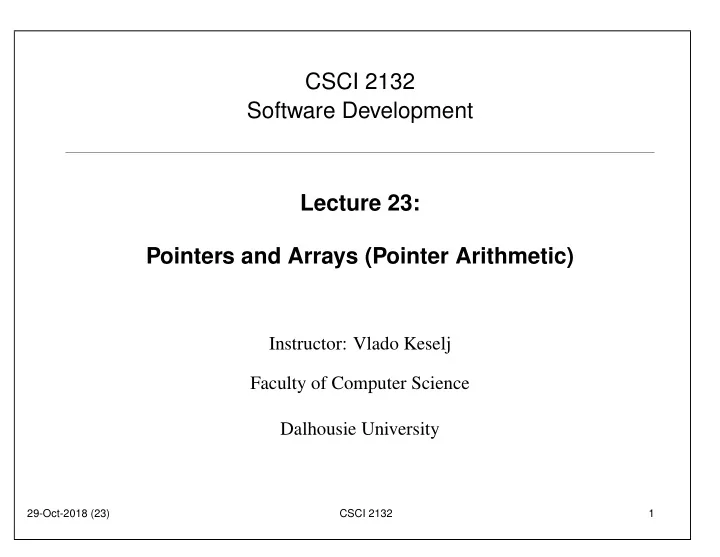

CSCI 2132 Software Development Lecture 23: Pointers and Arrays (Pointer Arithmetic) Instructor: Vlado Keselj Faculty of Computer Science Dalhousie University 29-Oct-2018 (23) CSCI 2132 1
Previous Lecture • Review of matrial from Lab 7: – Introduction to ‘make’ and Makefile – Review of history of Version Control Systems (rcs, cvs, Subversion, git) – Introduction to git, github, and GitLab • Review of pointers • Finished statistics.c example 29-Oct-2018 (23) CSCI 2132 2
Using const to Protect Arguments • Passing pointers as arguments is usually done for function to make change to the caller variables • Another reason: efficiency • We may want to prevent accidental change to the arguments • Example: void f(const int *p) { /* The function is not allowed to modify *p */ } 29-Oct-2018 (23) CSCI 2132 3
Pointers and Arrays • In C, pointers and arrays are closely related • Array name is a pointer to 0th element of the array • This is why an array argument is passed as a pointer • Example: int a[10]; int *p = &a[0]; • Equivalent to: int *p = a; 29-Oct-2018 (23) CSCI 2132 4
Pointer Arithmetic: Pointer + Integer • We can add integer to a pointer: – If p points to a[i] , p+j points to a[i+j] • Example: 1: int a[10] = {9}; 2: int *p = &a[1]; 3: (*(p+3))++; 4: printf("%d %d\n", a[1], a[4]); • What is the output of this program? 29-Oct-2018 (23) CSCI 2132 5
Pointer Arithmetic: Subtraction • We can subtract integer from a pointer: – If p points to a[i] , then p-j points to a[i-j] • We can subtract pointers: – If p points to a[i] and q points to a[j] , then p-q is j-i • Example: int a[10]; int *p = &a[0]; int *q = &a[5]; printf("%d\n", p-q); • What is the output? 29-Oct-2018 (23) CSCI 2132 6
Pointer Comparison • If pointers p and q point to elements of the same array a[i] and a[j] then – if i < j ⇒ p < q – if i == j ⇒ p == q – if i > j ⇒ p > q • What if we compare pointers or subtract pointers that do not point to the elements of the same array? 29-Oct-2018 (23) CSCI 2132 7
Pointer Comparison • If pointers p and q point to elements of the same array a[i] and a[j] then – if i < j ⇒ p < q – if i == j ⇒ p == q – if i > j ⇒ p > q • What if we compare pointers or subtract pointers that do not point to the elements of the same array? • Undefined behaviour 29-Oct-2018 (23) CSCI 2132 8
More Equivalent Statements • a[2] = 4; and *(a+2) = 4; • *(p+3) = 5; and p[3] = 5; • Code: int i; for (i = 0; i < 10; i++) a[i] = 0; • and for (p = a; p < &a[10]; p++) *p = 0; 29-Oct-2018 (23) CSCI 2132 9
. . . continued • Also equivalent loop: for (p = a; p < a+10; p++) *p = 0; • A difference between array name and pointer: cannot change array name value (i.e., array location) • Note: ++ and -- have higher precedence than * • I.e., *p++ means *(p++) rather than (*p)++ • Array parameters can be expressed as pointers, e.g.: int max_array(int *a, int len); 29-Oct-2018 (23) CSCI 2132 10
Efficiency of Pointers vs. Arrays • Pointer arithmetic has been generally more efficient • However, modern compilers optimize subscripts to be as efficient as pointer arithmetic • Using subscripts requires using two variables: array name and index • Compilers usually do not do extensive optimization by default • Example: gcc -O3 29-Oct-2018 (23) CSCI 2132 11
Mergesort Revisited • Let us look at a Mergesort algorithm implemented using pointer arithmetic • Fill-in-the-blanks code available at: ˜prof2132/public/mergesort2.c 29-Oct-2018 (23) CSCI 2132 12
Recommend
More recommend